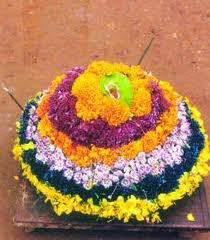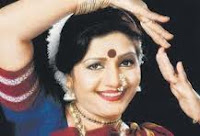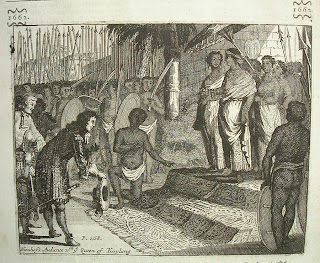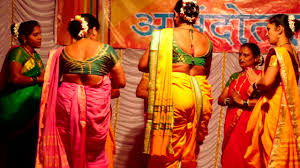"Bathukamma" and its Significance





''Bathukamma Bathukamma Uyalo, Bangaru Bathukamma Uyalo''
Bathkamma, often referred to as Bathukamma, is a widely celebrated festival in the state of Telangana, occurring throughout the months of September and October, which coincides with the arrival of the spring season. This period is commonly referred to as Aswiyuja and culminates two days prior to the festival of Dussera, known as Durgashtami.
The term 'Bathuku' signifies the concept of life, while 'Amma' refers to various entities like as mothers, daughters, womenfolk, and the divine figures of Goddess Durga or Shakti, who are regarded as the Universal mother. Once again, males are making requests or pleas to women, aiming to ensure their happiness and ease, as the whole well-being of the family is contingent upon the happiness of women.
There exist numerous narratives associated with the celebration of this occasion. Nevertheless, it is imperative to acknowledge that women should be afforded the opportunity to exercise their freedom of expression, encompassing activities like as singing, dancing, and allocating personal time for self-care.
The Bathukamma celebrations serve as a representation of the intrinsic connection between flowers, water, and human beings. The deity known as Goddess Gowri is traditionally crafted using a type of clay called 'Buddemma' prior to the commencement of the Bathukamma festival. On the concluding day of the festival, both Bathukamma and the Buddemma figurine are ceremoniously immersed in water. Bathkamma is a traditional floral arrangement consisting of seven concentric layers, resembling a cone, and composed of seasonal flowers. The term "Bathuku" refers to the concept of life, while "Amma" denotes the role of a mother. The act of praying to the Goddess Mother is performed with the intention of seeking her protection and ensuring the welfare of all living beings, including animals and birds. The prayer is offered to protect and preserve the state of being a lady. .
Bathukamma is observed in the latter portion of the monsoon season, preceding the arrival of winter. The arrival of monsoon precipitation results in a significant influx of water into the 'cheruvulu' (ponds), fostering the growth of wildflowers that exhibit a diverse array of brilliant hues throughout the cultivated, uncultivated, and arid plains of the area. The two most prevalent floral species in question are referred to as "gunuka poolu" and "tangedi poolu.".
In addition to the aforementioned flowers, there are many other varieties such as banti, chemanti, and nandi-vardhanam. The 'shilpakka pandlu' (also known as 'sitpala pandlu') serve as a notable attraction in these arid regions throughout the current season. Next, there are two types of maize, jonna (jowar) and mokka jonna (maize), that are ready for harvesting. In the midst of these festivities, the women of Telangana partake in the celebration of Bathukamma, a cultural event that symbolises the splendour of nature via the use of a diverse array of colourful flowers.
During this annual event, individuals of all ages, including men, women, and children, engage in the practise of collecting various types of wildflowers such as gunuka, tangedi, lotus, alli, katla, and teku blossoms. These flowers are then meticulously arranged to create Bathukamma, a traditional floral arrangement. The tradition of Bathukamma involves women commencing the preparation of the festival in the afternoon. The flowers were trimmed, leaving only a short stem. They varied in colour and fragrance. They were then placed on a broad plate known as a tambalamu and assembled into a conical shape. The stack was adorned with a pumpkin flower positioned at its apex. Pumpkin flowers and fruit are often associated with the symbolism of progeny and the preservation of a woman's virginity.
The aforementioned celebration spans a duration of nine consecutive days and culminates on the auspicious occasion known as Durgastami. The primary day of celebration is known as Saddula Bathukamma, serving as the culminating event of the Bathukammab festival, observed two days before to Dussera.
During this period, ladies have the opportunity to revisit their parental homes, reconnect with cherished memories from their childhood, reunite with family members, reestablish connections with childhood friends, and immerse themselves in the natural surroundings of their town. During the week preceding the primary Bathukamma festival, daily rituals involving the creation of tiny Bathukammas are performed, culminating in their immersion in water.
During the concluding day of the festival, male individuals gather vibrant flowers from their natural surroundings, while female individuals meticulously arrange these flowers in a sequential manner on a metal plate, thereby creating a large-scale Bathukamma. In contemporary times, stainless steel plates are employed for the purpose of arranging..
During the nighttime hours, a significant number of women congregate within their respective localities, bringing along their Bathukammas. These floral arrangements are positioned at the centre, around which the ladies engage in synchronised dancing, coordinated footwork, and rhythmic clapping. Additionally, they partake in the collective singing of emotionally evocative Bathukamma folk songs..
The collective vocalisation of a group of individuals, known as a chorus, ensues subsequent to the initiation of a lead vocalist, whereby the rhythmic patterns of the traditional folk song resonate and echo across the local community, symbolising the distinctiveness of Telangana's cultural identity. Following the engagement with the traditional cultural artefact known as "Batukammalu," the female members of the community proceed to transport these objects on their heads, forming a procession that converges towards a larger body of water located inside the village or town.
Eventually, upon reaching the water pond, the "Batukammalu" are gradually submerged in the water following additional periods of recreational activities and vocal performances. Subsequently, the 'maleeda', a confectionery consisting of sugar or raw sugar and cornbread, is distributed among both immediate family members and anyone residing within the local community. Upon the conclusion of the Batukamma festivities, individuals make their way back to their respective residences, carrying empty 'taambaalam' vessels, while engaging in melodious songs that extol the virtues of Batukamma. The melodious tunes of Batukamma reverberate through the streets well into the late hours of the night throughout the whole week..
In urban areas as well, the celebration of Bathukamma is observed through various means, such as organising gatherings in residential colonies, conducting the festivities in apartment cellars, or convening ladies at a central location to partake in the ritualistic activities associated with Bathukamma. Nevertheless, an intriguing amalgamation of both classic and contemporary tunes may be observed. The act of forming a circle and engaging in collective singing serves as a symbolic representation of love, solidarity, and sisterhood..
Bathkamma, often referred to as Bathukamma, is a widely celebrated festival in the state of Telangana, occurring throughout the months of September and October, which coincides with the arrival of the spring season. This period is commonly referred to as Aswiyuja and culminates two days prior to the festival of Dussera, known as Durgashtami.
Bathukamma represents the embodiment of the cultural essence and identity of the Telangana region. The festival has emerged as a significant component of the cultural revival movement in Telangana and has just been designated as the official state festival in the newly established state. Bathukamma is a distinctive ceremonial practise that pays homage to the natural environment, first with the vibrant display of flowers and culminating in the immersion of floral arrangements in water bodies. The aforementioned celebration serves as a representation of the cultural character of Telangana.
.
The term 'Bathuku' signifies the concept of life, while 'Amma' refers to various entities like as mothers, daughters, womenfolk, and the divine figures of Goddess Durga or Shakti, who are regarded as the Universal mother. Once again, males are making requests or pleas to women, aiming to ensure their happiness and ease, as the whole well-being of the family is contingent upon the happiness of women.
There exist numerous narratives associated with the celebration of this occasion. Nevertheless, it is imperative to acknowledge that women should be afforded the opportunity to exercise their freedom of expression, encompassing activities like as singing, dancing, and allocating personal time for self-care.
The Bathukamma celebrations serve as a representation of the intrinsic connection between flowers, water, and human beings. The deity known as Goddess Gowri is traditionally crafted using a type of clay called 'Buddemma' prior to the commencement of the Bathukamma festival. On the concluding day of the festival, both Bathukamma and the Buddemma figurine are ceremoniously immersed in water. Bathkamma is a traditional floral arrangement consisting of seven concentric layers, resembling a cone, and composed of seasonal flowers. The term "Bathuku" refers to the concept of life, while "Amma" denotes the role of a mother. The act of praying to the Goddess Mother is performed with the intention of seeking her protection and ensuring the welfare of all living beings, including animals and birds. The prayer is offered to protect and preserve the state of being a lady. .
Bathukamma is observed in the latter portion of the monsoon season, preceding the arrival of winter. The arrival of monsoon precipitation results in a significant influx of water into the 'cheruvulu' (ponds), fostering the growth of wildflowers that exhibit a diverse array of brilliant hues throughout the cultivated, uncultivated, and arid plains of the area. The two most prevalent floral species in question are referred to as "gunuka poolu" and "tangedi poolu.".
In addition to the aforementioned flowers, there are many other varieties such as banti, chemanti, and nandi-vardhanam. The 'shilpakka pandlu' (also known as 'sitpala pandlu') serve as a notable attraction in these arid regions throughout the current season. Next, there are two types of maize, jonna (jowar) and mokka jonna (maize), that are ready for harvesting. In the midst of these festivities, the women of Telangana partake in the celebration of Bathukamma, a cultural event that symbolises the splendour of nature via the use of a diverse array of colourful flowers.
During this annual event, individuals of all ages, including men, women, and children, engage in the practise of collecting various types of wildflowers such as gunuka, tangedi, lotus, alli, katla, and teku blossoms. These flowers are then meticulously arranged to create Bathukamma, a traditional floral arrangement. The tradition of Bathukamma involves women commencing the preparation of the festival in the afternoon. The flowers were trimmed, leaving only a short stem. They varied in colour and fragrance. They were then placed on a broad plate known as a tambalamu and assembled into a conical shape. The stack was adorned with a pumpkin flower positioned at its apex. Pumpkin flowers and fruit are often associated with the symbolism of progeny and the preservation of a woman's virginity.
The aforementioned celebration spans a duration of nine consecutive days and culminates on the auspicious occasion known as Durgastami. The primary day of celebration is known as Saddula Bathukamma, serving as the culminating event of the Bathukammab festival, observed two days before to Dussera.
During this period, ladies have the opportunity to revisit their parental homes, reconnect with cherished memories from their childhood, reunite with family members, reestablish connections with childhood friends, and immerse themselves in the natural surroundings of their town. During the week preceding the primary Bathukamma festival, daily rituals involving the creation of tiny Bathukammas are performed, culminating in their immersion in water.
During the concluding day of the festival, male individuals gather vibrant flowers from their natural surroundings, while female individuals meticulously arrange these flowers in a sequential manner on a metal plate, thereby creating a large-scale Bathukamma. In contemporary times, stainless steel plates are employed for the purpose of arranging..
During the nighttime hours, a significant number of women congregate within their respective localities, bringing along their Bathukammas. These floral arrangements are positioned at the centre, around which the ladies engage in synchronised dancing, coordinated footwork, and rhythmic clapping. Additionally, they partake in the collective singing of emotionally evocative Bathukamma folk songs..
The collective vocalisation of a group of individuals, known as a chorus, ensues subsequent to the initiation of a lead vocalist, whereby the rhythmic patterns of the traditional folk song resonate and echo across the local community, symbolising the distinctiveness of Telangana's cultural identity. Following the engagement with the traditional cultural artefact known as "Batukammalu," the female members of the community proceed to transport these objects on their heads, forming a procession that converges towards a larger body of water located inside the village or town.
Eventually, upon reaching the water pond, the "Batukammalu" are gradually submerged in the water following additional periods of recreational activities and vocal performances. Subsequently, the 'maleeda', a confectionery consisting of sugar or raw sugar and cornbread, is distributed among both immediate family members and anyone residing within the local community. Upon the conclusion of the Batukamma festivities, individuals make their way back to their respective residences, carrying empty 'taambaalam' vessels, while engaging in melodious songs that extol the virtues of Batukamma. The melodious tunes of Batukamma reverberate through the streets well into the late hours of the night throughout the whole week..
In urban areas as well, the celebration of Bathukamma is observed through various means, such as organising gatherings in residential colonies, conducting the festivities in apartment cellars, or convening ladies at a central location to partake in the ritualistic activities associated with Bathukamma. Nevertheless, an intriguing amalgamation of both classic and contemporary tunes may be observed. The act of forming a circle and engaging in collective singing serves as a symbolic representation of love, solidarity, and sisterhood..
There exists a concept that wild flowers derived from the environment include inherent qualities that enable them to effectively filter water..
In the district of Adilabad, the Gond women engage in the collection of a specific variety of Gunugu blossoms, which are afterwards utilised in the production of the Boddemma cone. In this region, Bathukamma is alternatively referred to as Boddemma.
In the district of Adilabad, the Gond women engage in the collection of a specific variety of Gunugu blossoms, which are afterwards utilised in the production of the Boddemma cone. In this region, Bathukamma is alternatively referred to as Boddemma.










Comments